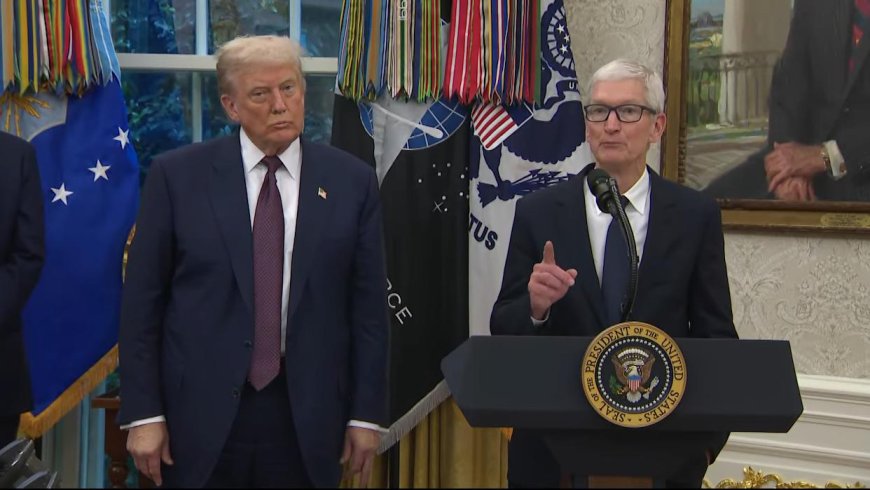Apple and White House Seal $100 Billion Manufacturing Deal, Marking Historic U.S. Investment Surge
Apple announces a new $100 billion U.S. manufacturing deal with the Trump administration, boosting its total American investment to $600 billion in just four years. Here's what it means for tech and the economy.

Apple–White House $100 B Manufacturing Deal: A New Era for U.S. Tech Investment
Washington D.C., August 7, 2025 — In a landmark announcement that could redefine the trajectory of American tech manufacturing, Apple Inc. and the White House have jointly unveiled a $100 billion manufacturing deal aimed at expanding Apple’s footprint within the United States. The deal, brokered under the Trump administration, increases Apple’s total U.S. investment to an eye-popping $600 billion over just four years—a record-setting commitment by a tech company on U.S. soil.
The historic agreement, revealed during a joint press event at the White House, signals the deepening partnership between Apple and federal policymakers amid growing global pressures to decouple from overseas supply chains, particularly those tied to China.
A Shift from Silicon Valley to American Soil
Apple CEO Tim Cook stood beside President Donald Trump, praising the administration’s push for “economic nationalism” and “resilience in domestic production.” The fresh $100 billion allocation will reportedly be used to build and expand chip manufacturing facilities, advanced robotics assembly plants, and renewable-energy-supported data centers in several U.S. states, including Texas, Ohio, and North Carolina.
“This is not just an investment in infrastructure—it’s an investment in American workers, innovation, and security,” said Cook.
Trump’s Signature Deal
President Trump touted the agreement as one of the key achievements of his second term, calling it a “blue-collar tech boom” moment. “What we’re seeing today is the greatest tech comeback to American soil. It’s about jobs, innovation, and restoring our industrial greatness,” Trump stated during the announcement.
He also reiterated that this deal serves as a signal to other tech companies that "America is open for business—and building."
Where the Money’s Going
According to insiders familiar with the deal:
-
$30 billion is earmarked for microchip fabrication facilities in Texas, aligning with recent expansions of Apple’s partnership with TSMC USA.
-
$20 billion will support AI-driven automation systems to enhance manufacturing productivity across all domestic sites.
-
$25 billion will go toward upskilling programs and community tech education centers in underserved regions.
-
The remaining $25 billion will boost cloud infrastructure and privacy-focused development centers, especially in Ohio and Nevada.
Apple’s existing initiatives such as its Advanced Manufacturing Fund will also be scaled alongside this new wave of funding.
A Jobs Revolution?
Early projections suggest this deal will create over 250,000 direct jobs and potentially support another 500,000 in the surrounding economy. Apple confirmed that job creation will begin in Q4 2025, with most roles focused on engineering, cleanroom manufacturing, logistics, and tech training.
Labor unions have largely praised the deal, with the AFL-CIO releasing a statement: “This is the kind of corporate responsibility America needs. Tech companies owe it to our economy to build where they sell.”
High Stakes and Global Messaging
This move is seen by analysts as a sharp counterpunch to mounting geopolitical tensions. In the wake of renewed global tariffs, international sanctions, and shifting alliances, bringing high-tech production back to the U.S. offers Apple both security and branding benefits.
“This is about resilience. Apple is making itself less dependent on volatile supply chains and more tied to American confidence,” said Brookings Institution’s senior economist Laura Atwell.
Political and Market Implications
While some critics see the deal as politically motivated, especially given its timing before the 2025 Congressional elections, most market watchers are optimistic. Apple’s shares jumped 3.8% on the NASDAQ following the announcement.
Economists have also speculated this may prompt other tech giants such as Google, Amazon, and Microsoft to boost their own domestic infrastructure—especially if favorable tax incentives or regulatory breaks are in the mix.
According to CNBC, early signals suggest “a reshuffling of global tech investment priorities” might already be underway.
The Road Ahead
While the full impact of this massive deal will take years to unfold, it undoubtedly sends a strong message about the future of tech, labor, and geopolitics. As Tim Cook concluded, “The next great chapter of innovation will be written right here in the United States.”
Conclusion
The Apple–White House $100 billion deal marks a decisive moment in modern economic history. Beyond headlines, it promises to fundamentally shift how and where America’s most valuable company builds its future. As the world watches, one thing is certain—Apple just bet big on America.











